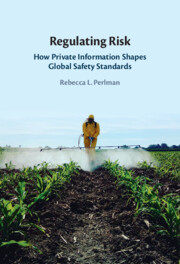‘In a cogent, creative, and multi-method study deeply relevant to the emerging world of risk regulation, Rebecca Perlman has recast the locus of regulatory power. It rests with those who control information. The resulting interplay of firms and regulators both distributes power and creates implicit trade barriers, and what might look like intentional capture often arises instead from a battle over scientific information.’
Daniel Carpenter - Allie S. Freed Professor of Government at Harvard University and author of Preventing Regulatory Capture and Reputation and Power: Organizational Image and Pharmaceutical Regulation at the FDA
‘Regulating Risk explains how industry control over data skews the decisions of expert committees … Rebecca Perlman reveals how large firms push out their older products, leaving other firms and developing countries to pay the costs of constantly upgrading standards. This fascinating study about safety standards and trade rules develops a broader theory about the complex interaction between science, industry, and policy.’
Christina L. Davis - Edwin O. Reischauer Professor, Department of Government Harvard University
‘An original contribution to the study of government regulation and non-tariff trade barriers. Perlman clearly and cleverly demonstrates how companies make precautionary risk regulation into a source of competitive advantage.’
David Vogel - Professor Emeritus, Haas School of Business, Department of Political Science, and Editor, California Management Review
‘Regulating Risk is an important book for everyone interested in global regulation and governance. It shows how producers use their advantage in scientific information to strategically shape the information environment of regulators - and results in policies that steer consumer purchases to high profit areas. This is good for producers, bad for consumers and developing countries, and poses a real dilemma for both national and international regulation.’
Duncan Snidal - Nuffield College, Oxford





